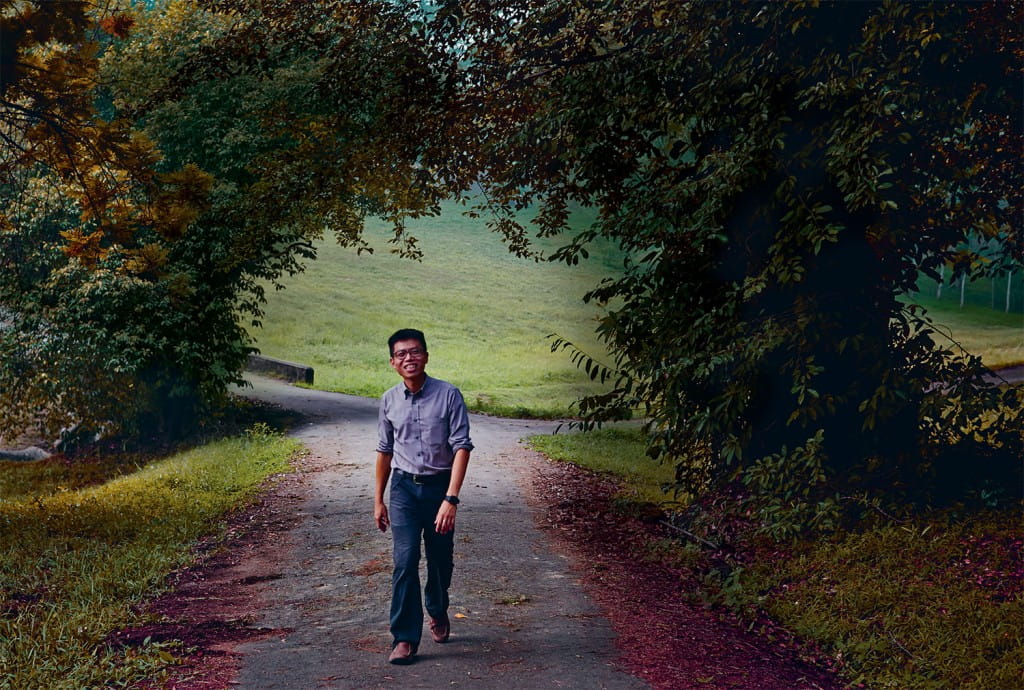
Playing the role of citizen ambassador, Yunnan-based Singaporean doctor Loh Cheng has created a network of relationships linking the Chinese and international communities to raise the standard of health care in the province.
BY ABIGAIL CHIA
PHOTO JUSTIN LOH
n a remote Yunnan village near the Chinese border with Myanmar, Singaporean doctor Loh Cheng was waiting by the side of a dirt road for a friend when he saw a car drive past, stop and make a quick U-turn back towards him.
A man he did not recognise then got out and greeted him. The man’s daughter had been critically ill three years earlier, suffering from a severe muscle infection in her legs. Dr Loh had helped to raise funds and organise treatment for her.
She recovered, and is now able to walk and dance. The man recognised Dr Loh and, expressing his gratitude, stopped to offer him a free ride to his destination.
It is moments like these – occurring during Dr Loh’s frequent trips to provide free medical care to villagers in rural Yunnan – that make his day.
Dr Loh, 40, who teaches medical students at the Second Affiliated Hospital of Kunming Medical University in the province’s capital city, says: “What I do now will not have an impact in the short term. But (these moments) remind me that whatever I do is meaningful and beneficial. Even if it helps one person, it is enough.”
His decision to relocate was driven by a desire to give back to society. He had been influenced while visiting his Singaporean friend and mentor Dr Tan Lai Yong in Yunnan.
Dr Tan had been providing free medical attention to poor villages and training local doctors in rural China for 15 years. Dr Loh and his family moved to Kunming in 2008, when he accepted a job offer to become the hospital’s Residency Training Coordinator. He says: “I was young and enthusiastic. It was not because of the pay package, which was not fantastic, but it was an opportunity.”
“Ultimately, I would like the locals to be inspired and motivated to do what I do, and even do it better than me.”
Dr Loh Cheng
FORGING STRONG TIES
In Kunming, Dr Tan introduced him to an invaluable network of people and organisations, from local non-profit organisations and the Chinese authorities to international humanitarian groups. These connections were pivotal to Dr Loh’s role in bridging the Chinese and international communities, whether in getting medical aid to those who could not afford it or in facilitating training between local and international medical professionals.
Dr Loh has built on the relationships and goodwill created by Dr Tan. Despite being the only Singaporean working at the hospital, his peers do not view him as a foreigner. They actively involve him in discussions and seek his opinions on workrelated matters. He says: “It’s a humbling privilege to be trusted and considered one of their own.”
He has gained enough rapport, trust and influence among local communities to be able to organise initiatives that improve the quality of health care and ensure equitable health-care access for all in Yunnan.
Besides organising trips for international medical volunteers to deliver medical aid to communities in inaccessible areas of Yunnan, he also connects local doctors with international medical teams to share knowledge and best practices. His proficiency in Mandarin has enabled him to translate medical jargon and provide the relevant context in these international cooperative efforts.
He is involved in a three-year collaborative project that started in 2015, linking the Singapore International Foundation as well as Singapore’s National University Health System and Saint Luke’s Hospital with the Second Affiliated Hospital of Kunming Medical University and the Yunnan Health and Development Research Association.
Through the sharing of skills, knowledge and resources, the project will improve the quality of health-care services for Yunnan’s ageing population.
His work won him the 2012 Business China Young Achiever Award, which recognises individuals and organisations that contribute to Singapore-China bilateral relations. He was also awarded the Yunnan “Cai Yun” prize in 2012 for his medical work for the people in Yunnan. He is the second Singaporean doctor to receive the prize, after Dr Tan.
Having spent seven years in Yunnan, Dr Loh sees himself contributing to the province’s medical education for another two years. He now oversees the training of both local and international medical students from countries such as India and Nepal under a new curriculum developed by his team.
After the pioneer batch of students graduate from the programme, Dr Loh plans to return home to care for his parents and get more training.
He does not worry that there is nobody to continue his work in Yunnan. He says: “Ultimately, I would like the locals to be inspired and motivated to do what I do, and even do it better than me.”
The signs are positive. Dr Loh cites examples of local doctors from the hospitals who have organised themselves to provide medical care in remote Yunnan villages.
Although Dr Loh’s China chapter may be ending, his humanitarian work is not finished. He plans to volunteer at a refugee camp when his youngest daughter, now four, reaches college age. He says: “There will always be conflicts of the kind that are happening in Syria and Afghanistan now, so there will always be a need for medical care.”
